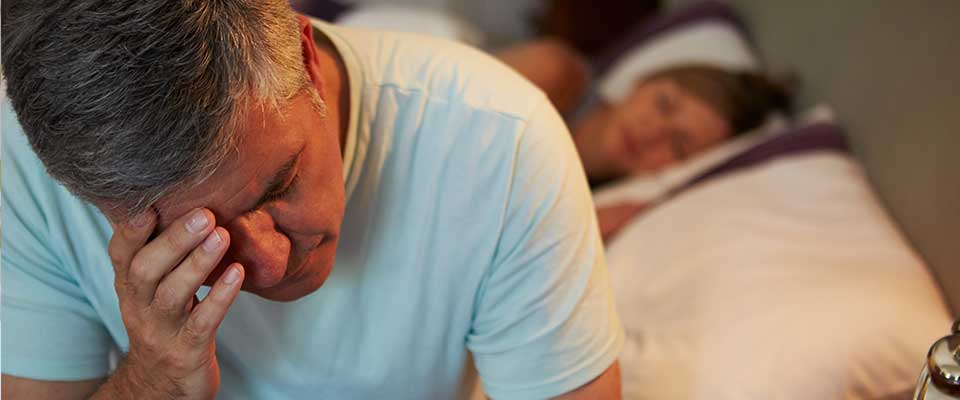From time to time, everyone experiences a loss of sleep. Whether it’s caused by jet lag or a stressful work situation, we’ve all flopped into bed, snuggled into our pillows, but then... sleep won’t come.
In the morning, we may experience the short-term effects of little sleep, including daytime drowsiness and an inability to focus. But at what point does the inability to sleep through the night begin to affect our health? And when should we consult our doctor about chronic insomnia?
First, how much sleep should we be getting?
Researchers say that adults should aim for 7 to 8 hours of sleep per night. Your sleep needs may change as you age. You’ll need to assess your own sleep patterns to see what amount works for you.
Chronic insomnia: Causes and conditions
The Sleep Foundation defines chronic insomnia as, “when a person has trouble falling asleep or staying asleep at least 3 nights per week for 3 months or longer.”
Sometimes it’s a simple matter of being unable to sleep, then having anxiety about not being able to sleep, resulting again in the inability to fall asleep the next night. See the pattern?
However, there are specific medical causes for insomnia too. Some include:
- Depression
- Anxiety
- Nasal/sinus allergies
- Gastrointestinal problems (reflux)
- Hyperthyroidism
- Arthritis
- Asthma
- Neurological conditions like Parkinson's disease
- Chronic pain
- Low back pain
If you’re experiencing chronic insomnia, it’s a good idea to see your primary care doctor to rule out these underlying causes. It will give you answers and a course of action for putting your insomnia to bed.
Are there physical health risks for decreased sleep over long periods of time?
Health risks? Yes. Definite damage to our health? No.
Although the Centers for Disease Control and Prevention (CDC) notes that chronic physical diseases and conditions like diabetes and obesity are linked to insomnia, insomnia has not been deemed the sole cause of these conditions.
A likely explanation for the linkage is that people with stress or anxiety and chronic insomnia may turn to unhealthy lifestyle choices, like smoking, drinking more alcohol, or eating fatty or sugary foods, in response to stress. These lifestyle choices may cause chronic conditions like diabetes.
That isn’t to say that there are no risks to chronic insomnia. One example? between 2005 and 2009, drowsy driving was responsible for approximately 83,000 crashes, as reported by The National Highway Traffic Safety Administration
Tips for putting chronic insomnia to bed
- Turn off cell phones and computers 2 hours before bedtime. The blue light from screens disrupts circadian rhythms and the production of melatonin, which are crucial for good sleep
- Get more exercise. Daily exercise decreases stress and anxiety and helps tire out your body for a better night’s sleep
- Cut out alcohol and caffeine late in the day. Caffeine can affect you for up to 8 hours, so be sure to stop drinking coffee, tea, and soda before 1pm. Also, while alcohol may make you temporarily sleepy, it also reduces rapid eye movement (REM) sleep and can result in insomnia
- Use blackout curtains or wear an eye mask. Even tiny amounts of light can signal your brain that it’s time to wake up
Bonus: Read our other article on "What to do when you can't fall asleep."
Use your bedroom only for sleeping, avoiding it during the daytime
One cause of insomnia is the association of your bed with being awake. Therefore, if you’re used to talking on the phone or watching movies on your iPad in bed, your brain is also used to being awake while in bed.
Using your bedroom for sleep only will help your brain associate the space with being calm and drowsy.
Conclusion
If you’re experiencing chronic insomnia, make an appointment with your primary care doctor to rule out underlying conditions as possible causes. They will also recommend resources like sleep therapy to help you get back on a normal sleep schedule.
1. https://sleepfoundation.org/insomnia/content/what-causes-insomnia
2. https://www.cdc.gov/sleep/about_sleep/drowsy_driving.html
3. https://sleepfoundation.org/ask-the-expert/stress-and-insomnia




